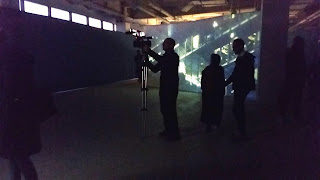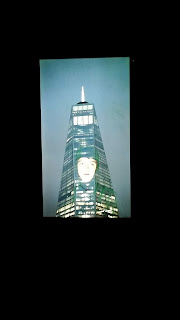Exchange went something like this:
Artist Rainer Ganahl:
I decided to get rid of my books to express how we don't live forever, we need to let go of our material goods, we need to realize we're not going to read that book again.
Young man:
How much are you selling this one for?
The books are lying on the floor, as for a stoop sale. Good books. Art books, philosophy.
Rainer:
How much would you like to buy it for?
The young man turns it around in his hands. He's embarrassed. Haggling with the artist?
Young man:
$10?
Rainer:
I couldn't let it go for that. It's worth much more. What I do is I check on the Internet how much they go for. I think it should not go for less than $20, more like $30.
Older man:
So you are linking this to the existing market?
Rainer:
The books I don't sell, I will keep. I don't need to sell. You see, on the wall, that's the packaging.
Older man:
How about this one, how much?
Rainer:
Maybe $35? Let me check on the Internet. Some of these books are widely available, but others like this one are very hard to find, it took me a long time to unearth them in libraries. By the way, before I was able to buy art books, I used to buy postcards of art. They're $3 each. Look here. Ah, I found the book online. Let's see. $12.75! Well well. OK, how about $20?
As opposed to my poetic Eric the Hawker selling me his lovely keyring last week (read here), I could not perceive any artistic dimension to this sale by Rainer Ganahl beyond the initial concept. He could have chosen to put arbitrary prices on the books: white ones $10, green ones $25, black ones $1000. Or, as Ed Schmidt did in one of his shows, give them away for nothing. After this unpleasant experience, I was getting truly discouraged by Performa 2015. The abundance of free drinks this year is appreciable, and attracts a younger crowd, but that's the only improvement I could see in this edition of the festival.
On Friday night, went to the Erica Vogt event at Roulette, Artist Theater Program.
I did not understand. I felt like someone from mainstream American culture, fed on Hollywood movies, mass paperbacks, who would go to an avant-garde event and would think it's all nonsense: they would not have the tools to understand it, the references, the context. I don't know whether the show was nonsense or not. But if it has a sense, I didn't have the tools to understand it. I did enjoy aspects of it, such as the sounds, some of the readings, some of the projections. Hated the props. Loved the last scene, witty, where the artist came on stage, and all the performers sat at her feet. She asked:
What did you think of the imagery in the show?
The twelve of them all answered at the same time, with much earnestness and expressivity. Obviously the mangled chaos of words could not be grasped by the audience. Then the lights went out, and the scene was repeated by people in the audience discussing amongst themselves after the show. I turned to my friend, artist Ana Bilankov who know a thing of two about avant-garde work:
'What did you think'
She opened her eyes big, raised her eyebrows:
'Bewildered.'
But. At last. Jesper Just. Saturday November 14. The exhilaration of seeing a brilliantly conceived show. Occupies the whole top floor of a skyscraper near the World Trade Center. We're inside the building, can't see outside apart for tiny shapes scraped out of painted windows. And the show offers us interpretations of what we would see outside the windows. We watch from high up, on a video, the people who should be working in this space, but instead of sitting at desks are roaming the wilderness, in anguish.
The same live projection of the exterior of the building punctuate our route as we make our way in a labyrinth around the place. It takes a while before we realize that the beautiful bass sound track is being played live and we can see the player on the projected live stream, tiny, sitting lonely on the floor of our large office building. But what floor? Fleeting people get projected over a photo of the World Trade Center. In the next room, we realize these people are in front of a camera, and their image, or now ours, and is projected onto the World Trade Center photo for the audience in the previous room. Then a woman takes her place in front of the camera and sings to the accompaniment of the bass player who is still going, who we know is there somewhere, but where? Her song is a poignant lament.
The poignancy in her song, and in the bass playing, the loneliness of the images, the anguish of the employees looking for something in the wild, all expressed so aptly what the architectural environment, and the work conditions in these financial districts do: kill the human soul.
Contributed by - - Arabella Hutter





Fun report! Wish I had been able to attend!
ReplyDelete